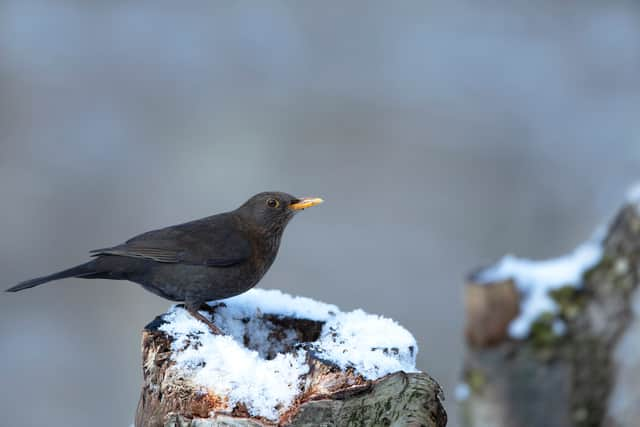RSPB: Three ways to 'throw garden birds a lifeline' during the winter cold snap
This article contains affiliate links. We may earn a small commission on items purchased through this article, but that does not affect our editorial judgement.
and live on Freeview channel 276
As snow flurries paint parts of the UK white, a wildlife charity is urging Brits to prepare for an influx of cold, hungry garden birds - and help them, if they can.
Much of the UK are braced for colder temperatures in the next few days, with snow and sleet forecast in several regions - including parts of London - and a host of yellow weather warnings are in force. The Royal Society for the Protection of Birds (RSPB) is now calling on the public to take some easy steps to help the wild birds and animals we share of gardens with, to help them make it through the winter cold snap too.
Advertisement
Hide AdAdvertisement
Hide AdThe charity says that as natural food supplies run low, the colder weather will draw more birds and other wildlife to Britain's gardens and greenspaces over the coming weeks - in search of food, water and shelter. Birds need more energy to stay warm at this time of year and have fewer daylight hours to find food, while the countryside has been stripped bare of the food sources they rely upon.
To help with their plight during the lower temperatures forecast in the coming days, the RSPB has shared its top three tips to help the wildlife on your doorstep.


3. Provide a feast for your feathered friends
Kitchen scraps like mild grated cheese, bruised fruit, cooked rice, unsalted bits of hard fat, roast potatoes and dry porridge go down a treat with garden birds. You can provide an excellent full-fat winter food by making your own bird cakes or fat balls. The RSPB also suggests calorie-rich foods like mixed seed, sunflower seed, nyjer seed and good quality peanuts.
2. Keep water sources fresh
Birds need clean water for drinking and bathing all year round, but finding sources of fresh water can be hard at as temperatures drop. Be sure to check your bird bath isn’t frozen and keep it topped up with fresh, clean water. Keeping your feeders clean is also essential to help reduce the spread of disease - the RSPB recommends cleaning them once a week with a mild detergent solution, such as washing up liquid. Remember to wear gloves and discard of any unused or mouldy food.
Advertisement
Hide AdAdvertisement
Hide Ad1. Provide shelter from the elements
Providing shelter from the harsh weather goes a long way in helping wildlife. Planting dense hedges such as privet or hawthorn or letting ivy and holly grow will provide a great place for birds to roost, and allows other wildlife to shelter from the elements too, the RSPB says. Nestboxes are also readily occupied on cold winter’s nights, with birds cosying up together for communal warmth. The record number of birds found in one box was 63 wrens, the wildlife charity said.
The wildlife enquiries manager, Charlotte Ambrose, added: “There is no better time to be feeding garden birds than during the winter, whether that be with favourites like fat balls or with kitchen scraps like grated mild cheese and bruised fruit. As many of our feathered friends look for alternative food sources as natural supplies run low, a flutter of wings at your feeder can bring an immense sense of joy."
The RSPB's Big Garden Birdwatch is just around the corner now, she said, there was no time like the present to get acquainted with garden visitors. "This free event in January saw nearly over half a million people take part last year, telling us about the birds they saw in their garden or local greenspace during one hour to help us to monitor garden bird populations."
To find out more about the Big Garden Birdwatch and how you can take part from 26-28 January, you can visit the RSPB website here.
Comment Guidelines
National World encourages reader discussion on our stories. User feedback, insights and back-and-forth exchanges add a rich layer of context to reporting. Please review our Community Guidelines before commenting.
